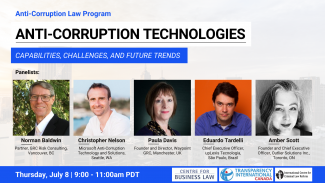
The ACLP continues its series of monthly webinars in 2021 that feature industry experts who share ideas and insight with their peers to help public and private sector policy makers combat corruption more effectively.
On July 8th at 9:00 am PDT, join our group of distinguished panelists as they discuss the pros, cons, and future outlook for technologies designed to detect, prevent, and mitigate corruption.
Selected discussion topics:
- Can technology tell us if someone has taken a bribe? Tools that can identify money laundering, fraud, and related activities and have been in widespread use for many years, but can they determine if someone is involved in corruption?
- What are the challenges we face? AI (artificial intelligence), OSINT (open source intelligence), big data analytics, blockchain, and other tools are rapidly transforming our due diligence and fraud/AML investigations, but how effectively are organizations and governments using these technologies to fight corruption?
- Is this technology helping us win? Organizations can now detect and prevent corruption earlier and better than ever. Machine learning apps, for example, can now assign a corruption probability to public officials. But how far are we from where we want to be? And how do we balance the human element?
- What about GovTech (technologies designed to make the public sector more efficient) and promoting accountability through more accessible and useful data? Governments are slowly but increasingly automating their bureaucratic processes and public services, which has a direct effect on deterring corruption. Are governments in the USA, UK, and Canada leading or lagging in these efforts to combat corruption?
- Where are we headed? There are plenty of opportunities ahead, but our expectations needs to be reasonable. How much should we allow technologies like artificial intelligence to replace human analysis?
Our panelists:
Norman Baldwin – Partner, GRC Vista Risk Consulting – Vancouver, BC
Paula Davis – Founder and Director, Waypoint GRC – Manchester, UK
Christopher Nelson – Microsoft Anti-Corruption Technology and Solutions, Seattle, WA
Eduardo Tardelli – CEO upLexis Tecnologia – São Paulo, Brazil
Amber Scott – Founder and CEO, Outlier Solutions, Toronto, ON
Hosted by the Anti-Corruption Law Program, a collaborative partnership between the Centre for Business Law at the University of British Columbia Peter A. Allard School of Law, Transparency International Canada, and the International Centre for Criminal Reform & Criminal Justice Policy.
This event was recorded and can be viewed on YouTube:
- Centre for Business Law
- General Public
- Continuing Professional Development
- Law, Culture and Society